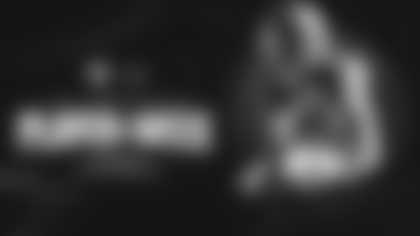Any good teacher keeps an eye out for students that aren't taking their studies seriously.
Decades ago, Anne-Marie Rhoades, a professor at the Loyola Chicago law school, had this concern about the inconsistent attendance of one of the students in her night-school Income Tax class.
"You keep your eye on areas of the room," said Rhoades. "You start to notice, 'Hey, there's a hole here too often.' When he was there, I started to notice that the male students were always excited."
Rhoades finally pulled the young law student aside after class to inquire why he was missing classes. The student told her that his job made him work on Monday nights occasionally.
Rhoades would come to realize that she was speaking to the kicker for the Chicago Bears. She could not have known that she was also speaking to the future Chief Justice of the Illinois Supreme Court.
Bob Thomas knew from an early age that law would be his profession. His talent as a kicker provided a decade-long detour through the NFL, spending the majority of his career in Chicago.
"I was a government major at Notre Dame," said Thomas. "I talked about being a lawyer. I thought that, hopefully, I'd have the opportunity to kick in the NFL and perhaps go to law school in that city."
Like any kicker, Thomas' career was defined by fourth-quarter field-goal attempts. As a senior at Notre Dame, he helped the Fighting Irish become the 1973 National Champions after drilling a 19-yard attempt to beat Alabama in the Sugar Bowl.
In a 1977 game against the New York Giants, Thomas ran onto the field in overtime to attempt a 28-yard field goal as time expired, hoping to put the Bears ahead and clinch the team's first playoff appearance in 14 years.
The field was covered in a thin layer of ice that would occasionally break, plunging players' cleats into freezing slush. Safety Doug Plank called the game "the most uncomfortable day of my life," and the game became known as the Slush Bowl.
Thomas had struggled to find his rhythm in these conditions but managed to come through when it mattered most.
"For a soccer-style kicker," said Thomas, "your plant foot is everything. It stuck that time, and I was able to put it through the middle. Then, it was just basically pandemonium."
A year later, Thomas began his journey into the legal profession. Though his plan had always been to attend law school during his playing days, he put off enrollment for three years after signing with the Bears in 1975.
Charles Murdock, then dean of the law school at Loyola, reached out to Thomas about attending night classes.
"I said, 'Maybe this offseason,'" said Thomas. "He said, 'How about this season?'"
Thomas got permission from the Bears' front office to take up to 10 hours of classes during the regular season and become a fulltime student for the rest of the year. After receiving his Juris Doctorate in 1981, he practiced law part-time in the western suburbs of Chicago until a knee injury ended his career one game into the 1986 season.
Though Thomas had little connection to the state of Illinois, having grown up in upstate New York, he knew that he wanted to settle in the Chicago area.
As a lawyer, Thomas achieved a relatively rare feat for an NFL player: to launch a second career that is arguably as notable as the first. Illinois voters may know Thomas by his full name, Robert R. Thomas, because that's the name that has been on their ballots for the past 32 years.
"When you first put on the robes," said Thomas, "you realize that you have more responsibility than you do power. I think the fact that I had my moment in the sun with the Bears--I'm still known more to people as a kicker than as the Chief Justice--helps you understand responsibility."
Thomas rose from a Circuit Judge in DuPage County to the Chief Justice of the Illinois Supreme Court, where he has served since 2001. In early February, Thomas announced that he would retire from the bench Feb. 29 and join his son in practicing law at the law firm Power Rogers.
Anne-Marie Rhoads once chided Thomas for missing class, but now he's part of her curriculum: his opinion in the 2013 DeHart v. DeHart decision recognized equitable adoption across the state, a significant change in family law and is required reading for Rhoades' Trust and Estate Law class.
"Every year, I teach that case," said Rhoades. "There's that element of letting my current students understand that the judge who wrote this was also here in this classroom, doing the same things you're doing. One never knows the path that you will end up on."







